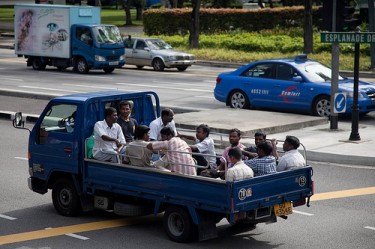Lee Yi Shyan [3], the Minister of State for Trade & Industry and Manpower, cautions against it.
By investing in our human resources, by encouraging our companies to innovate and by helping our low-wage workers acquire new skills, we’re confident that we can grow as a whole, and grow inclusively. The concept of a minimum wage policy is appealing politically but its implementation is not without pitfalls.
Stephanie Chok [4], writing for The Online Citizen, believes it will benefit the working poor
The point, ultimately, is to equalize the labour market and increase not only the earning power but also the bargaining powers of the working poor – powers that were gradually eroded over the years. Ensuring they are paid a fair wage that reflects current living costs is just a step in this direction, but one that should be taken.
Lucky Tan [5] responds to the argument that a minimum wage distorts the market and hurts employment creation
A minimum wage, if properly set, is the income required for decent living in Singapore. It only distorts the market and hurt the employment of workers when you have an economy dependent (on) low wages and many workers (are) currently employed below the minimum wage.
New Asia Republic offers these arguments against [6] the proposed minimum wage policy
Surely, it appears that a minimum wage is what we need in Singapore to help the lower wage workers. Yet there is more than it meets the eye. Such an analysis based on an individual worker’s well being without consideration to the co-workers, employer, economy and consumer, is myopic
It is important to acknowledge every individual has a place and value in the society, regardless of profession, race, qualifications or family background. The value of each individual in the society is not for the State to determine but up to each individual’s ability to contribute and value add his/her firm in the economy.
My Little Corner suggests the implementation of “guidelines” [7] to help workers
Singapore need not enact the Minimum Wage law. They can just issue guidelines on the Minimum Wage. The reason is quite simple. If you look at the objective, it's to determine the minimum wage needed to survive in Singapore. Therefore, it should be up to the employers to determine the job scope needed in order to justify hiring that person.
transitioning.org reminds policymakers that a minimum wage policy is already in place in numerous advanced countries [8] in the world
Its still a profound mystery why a economic powerhouse country like ours has so much reservation implementing minimum wage policy to better protect its vulnerable rank and file workers. Most first world countries and even third world countries have minimum wage policy in place so that workers have access to reasonably decent wages when they put in their fair share of work.
According to Singapore Notes [9], the “minimum wage” seems to be in effect already
The reality is that minimum wage exists in Singapore. The minimum starting pay for a cabinet minister is $1.5 million, regardless of not being backed by a single ballot cast in his name, not possessing prior track record in political office, or inexperience in managing a budget for a national mega project. The minimum for a senior minister is $3 million. You know what the top dog pays himself. And there are the minimum wage levels for permanent secretaries, superscale officers and a whole catalogue of fat cat civil servants.
The Mind Game reviews [10] the various viewpoints related to the issue
Personally, I think its unnecessary, if there are really other supply-demand considerations for other jobs, let the employers offer higher wages on their own. The purpose of the minimum wage is for the standard of living of a worker and not for the demands of the industry and market.
Yawning Bread is supportive of the workfare [11] program of the Singapore government. Words of the Cze also supports the expansion [12] of this program
putting in place a minimum wage is an effective and efficient method of intervening in the market to generate distributive social welfare, but only if there is a substantial lot of low-income workers languishing below the bar to be set. Otherwise it’s really an unnecessary distortion in the labour market.
Ravi Philemon asserts that living wage [13] is the better policy proposal
By paying people a `living wage,’ we show respect for them and what they do. We enable them to give something back. They have the income to spend more, local businesses, professionals, schools and even religious organisations, benefit. We also benefit as a community because people who are able to meet their basic needs by working a 44-hour week have time and energy for their family, their faith community, and civic life.
